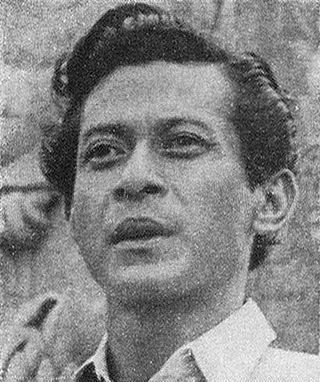Tan Tjoei Hock was an Indonesian journalist and filmmaker. Born in Batavia, he was discovered by The Teng Chun in the late 1930s. Tan became one of the most productive film directors of the Dutch East Indies between 1940 and 1941, directing nine films – primarily action.

Kedok Ketawa is a 1940 action film from the Dutch East Indies. Union Films' first production, it was directed by Jo An Djan. Starring Basoeki Resobowo, Fatimah, and Oedjang, the film follows a young couple who fight off criminals with the help of a masked man.

Panggilan Darah is a 1941 film from the Dutch East Indies written and directed by Sutan Usman Karim and produced by Tjho Seng Han for Oriental Film. The black-and-white film starred Dhalia and Soerip as orphaned sisters trying to make a living in the colonial capital of Batavia before moving to Kudus to work at a clove cigarette factory.
![<i>Srigala Item</i> 1941 [[Dutch East Indies]] film](https://upload.wikimedia.org/wikipedia/commons/d/d1/Srigala_Item_poster.jpg)
Srigala Item is a 1941 film from the Dutch East Indies that was directed by Tan Tjoei Hock and produced by The Teng Chun for Action Film. Starring Hadidjah, Mohamad Mochtar, and Tan Tjeng Bok, the film's plot – inspired by Zorro – follows a young man who became a masked vigilante to take revenge against his conniving uncle. Srigala Item was a commercial success, which Misbach Yusa Biran credits to the plot's use for escapism. A copy of the black-and-white film, which featured kroncong music, is stored at Sinematek Indonesia.
Sorga Palsoe is a 1941 film from the Dutch East Indies which was directed by Tan Tjoei Hock for Java Industrial Film. The tragedy, starring Lo Tjin Nio, Tong Hui, Lim Poen Tjiaw, and Rohana, was a commercial failure. It is likely lost.

Ismail Djoemala was an Indonesian actor active in the 1940s. He was often cast alongside Roekiah as her romantic interest.

Bengawan Solo is a now-lost 1949 film from what is now Indonesia. Directed by Jo An Djan, it starred Sofia WD, Rd Mochtar, and Mohamad Mochtar.
![<i>Matula</i> 1941 [[Dutch East Indies]] film](https://upload.wikimedia.org/wikipedia/commons/thumb/3/3d/Matula_ad.jpg/320px-Matula_ad.jpg)
Matula is a 1941 film from the Dutch East Indies which was directed by Tan Tjoei Hock and produced by The Teng Chun of Java Industrial Film. The black-and-white film, now likely lost, follows a young man who tries to give a woman's soul to a shaman as payment for being made handsome.
![<i>Wanita dan Satria</i> 1941 [[Dutch East Indies]] film](https://upload.wikimedia.org/wikipedia/commons/thumb/3/3b/Wanita_dan_Satria_cover.jpg/320px-Wanita_dan_Satria_cover.jpg)
Wanita dan Satria is a 1941 film from the Dutch East Indies directed by Rd Ariffien and produced by Ang Hock Liem for Union Films that is probably lost. Starring Djoewariah, Ratna Djoewita, Hidajat, Z. Algadrie, and Moesa, it follows a womaniser named Soedrajat who abuses his status to gain women's trust before ultimately getting his comeuppance. Reviews were mostly positive, with one praising the film's depiction of women's issues in a Muslim society.
Moestika dari Djemar is a 1941 film from the Dutch East Indies. Multiple modern sources also use the incorrect spelling Moestika dari Djenar, but contemporary sources uses an "m".
![<i>Dasima</i> 1940 [[Dutch East Indies]] film](https://upload.wikimedia.org/wikipedia/commons/1/16/Dasima_poster.jpg)
Dasima is a 1940 film from the Dutch East Indies directed by Tan Tjoei Hock and produced by The Teng Chun. It is the third adaptation of G. Francis' 1896 novel Tjerita Njai Dasima.

Hadidjah was an Indonesian film actress best known for partnership with Moh Mochtar in seven films released by Java Industrial Film between 1939 and 1941. She was the mother of Citra Award-winning musician Idris Sardi.
![<i>Si Gomar</i> 1941 [[Dutch East Indies]] film](https://upload.wikimedia.org/wikipedia/commons/2/2f/Poster_si_gomar.jpg)
Si Gomar is a 1941 film from the Dutch East Indies which was written and directed by Tan Tjoei Hock and produced by The Teng Chun. Starring Hadidjah, Mohamad Mochtar, and Tan Tjeng Bok, the movie follows a brother and sister who are separated by robbers and almost marry before their cousin recognises them.

Mohamad Mochtar, usually credited as Moh Mochtar, was an Indonesian film actor active from 1939 until his death in 1981.

Mas Sardi was an Indonesian composer and musician notable for being the country's first professional music supervisor. He and his wife Hadidjah were the parents of Citra Award-winning musician Idris Sardi.
Singa Laoet is a 1941 film from the Dutch East Indies. Directed by Tan Tjoei Hock and produced by The Teng Chun, it starred Tan Tjen Bok, Mohamad Mochtar, and Hadidjah.

Star Film was a film production company in the Dutch East Indies. Established by Chinese-Indonesian businessman Jo Eng Sek and Chinese cameraman Cho' Chin Hsin in 1940, it produced five black-and-white films in 1940 and 1941; two of these were directed by Jo, and the remainder were directed by Wu Tsun. Another film was under production when the studio was closed following the Japanese occupation of the Dutch East Indies. Star helped establish the careers of actors such as S Waldy and Elly Joenara, and produced screenplays written by Rd Ariffien and Saeroen; its output, however, is probably lost.

Ali Joego was a stage and film actor and director active in the Dutch East Indies and Indonesia. During his twenty-year career he appeared in thirty films and directed seven.



![<i>Srigala Item</i> 1941 [[Dutch East Indies]] film](https://upload.wikimedia.org/wikipedia/commons/d/d1/Srigala_Item_poster.jpg)


![<i>Matula</i> 1941 [[Dutch East Indies]] film](https://upload.wikimedia.org/wikipedia/commons/thumb/3/3d/Matula_ad.jpg/320px-Matula_ad.jpg)
![<i>Wanita dan Satria</i> 1941 [[Dutch East Indies]] film](https://upload.wikimedia.org/wikipedia/commons/thumb/3/3b/Wanita_dan_Satria_cover.jpg/320px-Wanita_dan_Satria_cover.jpg)
![<i>Dasima</i> 1940 [[Dutch East Indies]] film](https://upload.wikimedia.org/wikipedia/commons/1/16/Dasima_poster.jpg)

![<i>Si Gomar</i> 1941 [[Dutch East Indies]] film](https://upload.wikimedia.org/wikipedia/commons/2/2f/Poster_si_gomar.jpg)



